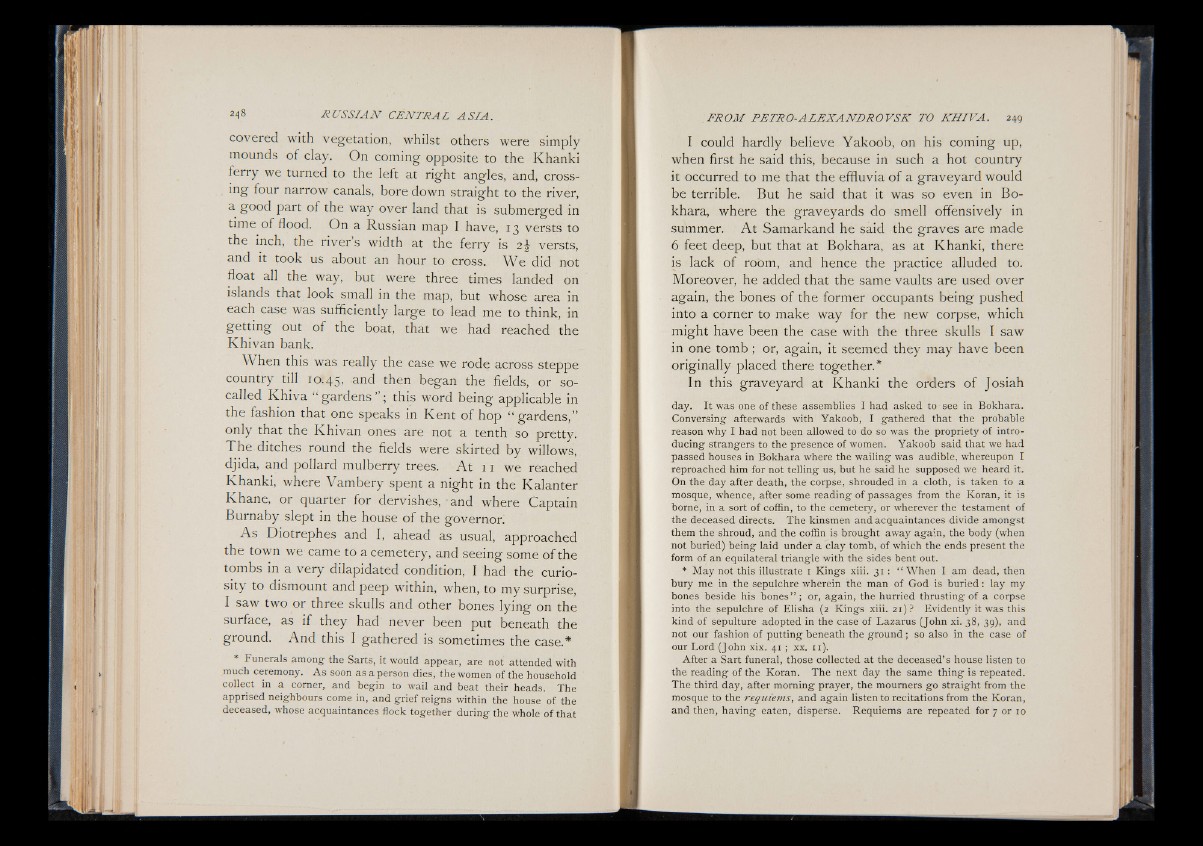
covered with vegetation, whilst others were simply
mounds of clay. On coming opposite to the Khanki
ferry we turned to the left at right angles, and, cross-
ing four narrow canals, bore down straight to the river,
a good part of the way over land that is submerged in
time of flood. On a Russian map I have, 13 versts to
the inch, the river’s width at the ferry is 2J versts,
and it took us about an hour to cross. We did not
float all the way, but were three times landed on
islands that look small in the map, but whose area in
each case was sufficiently large to lead me to think, in
getting out of the boat, that we had reached the
K hi van bank.
When this was really the case we rode across steppe
country till 10.45, and then began the fields, or so-
called Khiva “ gardens” ; this word being applicable in
the fashion that one speaks in Kent of hop “ gardens,”
only that the Khivan ones are not a tenth so pretty.
T he ditches round the fields were skirted by willows,
djida, and pollard mulberry trees. A t 11 we reached
Khanki, where Vambery spent a night in the Kalanter
Khane, or quarter for dervishes,'and where Captain
Burnaby slept in the house of the governor.
A s Diotrephes and I, ahead as usual, approached
the town we came to a cemetery, and seeing some of the
tombs in a very dilapidated condition, I had the curiosity
to dismount and peep within, when, to my surprise,
I saw two or three skulls and other bones lying on the
surface, as if they had never been put beneath the
ground. And this I gathered is sometimes the case.*
Funerals among the Sarts, it would appear, are not attended with
much ceremony. As soon as a person dies, the women of the household
collect in a comer, and begin to wail and beat their heads. The
apprised neighbours come in, and grief reigns within the house of the
deceased, whose acquaintances flock together during the whole of that
I could hardly believe Yakoob, on his coming up,
when first he said this, because in such a hot country
it occurred to me that the effluvia of a graveyard would
be terrible. But he said that it was so even in Bokhara,
where the graveyards do smell offensively in
summer. A t Samarkand he said the graves are made
6 feet deep, but that at Bokhara, as at Khanki, there
is lack of room, and hence the practice alluded to.
Moreover, he added that the same vaults are used over
again, the bones of the former occupants being pushed
into a corner to make way for the new corpse, which
might have been the case with the three skulls I saw
in one tomb; or, again, it seemed they may have been
originally placed there together.*
In this graveyard at Khanki the orders of Josiah
day. It was one of these assemblies I had asked to see in Bokhara.
Conversing afterwards with Yakoob, I gathered that the probable
reason why I had not been allowed to do so was the propriety of introducing
strangers to the presence of women. Yakoob said that we had
passed houses in Bokhara where the wailing was audible, whereupon I
reproached him for not telling us, but he said he supposed we heard it.
On the day after death, the corpse, shrouded in a cloth, is taken to a
mosque, whence, after some reading of passages from the Koran, it is
borne, in a sort of coffin, to the cemetery, or wherever the testament of
the deceased directs. The kinsmen and acquaintances divide amongst
them the shroud, and the coffin is brought away again, the body (when
not buried) being laid under a clay tomb, of which the ends present the
form of an equilateral triangle with the sides bent out.
* May not this illustrate I Kings xiii. 31 : “ When I am dead, then
bury me in the sepulchre wherein the man of God is buried: lay my
bones beside his bones” ; or, again, the hurried thrusting of a corpse
into the sepulchre of Elisha (2 Kings xiii. 21) ? Evidently it was this
kind of sepulture adopted in the case of Lazarus (John xi. 38, 39), and
not our fashion of putting beneath the ground; so also in the case of
our Lord (John xix. 41 ; xx. 11).
After a Sart funeral, those collected at the deceased’ s house listen to
the reading of the Koran. The next day the same thing is repeated.
The third day, after morning prayer, the mourners go straight from the
mosque to the requiems, and again listen to recitations from the Koran,
and then, having eaten, disperse. Requiems are repeated for 7 or 10